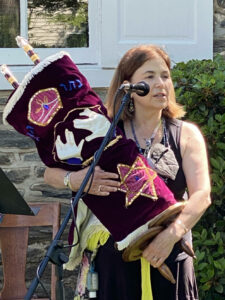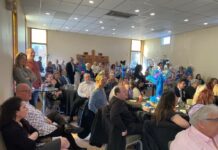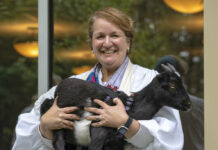
Ellen Braunstein
Back in 2017, Rabbi Shelley Barnathan met with 100 prospective members individually over coffee to ask some central questions about what they wanted in a new Reconstructionist synagogue in Philadelphia’s western suburbs.
She had just completed rabbinical school after leaving a 32-year career as a language arts teacher. A child of Holocaust survivors, she wanted to realize a childhood dream that wasn’t accessible in her Modern Orthodox community.
The spiritual leader of the new Congregation Or Zarua asked the prospective members, “What are the values that guide you in your life? How does Judaism blend with those values? What kind of meaning are you yearning to make in your life in this stage of
your life?”
What brought Or Zarua (Hebrew for light is sown) members together is a shared set of values, Barnathan said. The Main Line residents are committed to tikkun olam, or healing the world, and a progressive, adaptive approach to Reconstructionist Judaism for the modern world. They also want to have a say in a synagogue’s operations, for which many had been hierarchical.
“We’ve stayed true to our vision of planting seeds of light, seeing the light in each other,” Barnathan said. “We’ve been able to live centered in our values and that feels really rewarding.”
The synagogue, which shares space with a Quaker meeting house in Haverford Township, was started with funding from a Reconstructing Judaism Auerbach Launch Grant.
Or Zarua emphasizes “being in good relationship with each other,” Barnathan said, “and those of other faiths.”
Or Zarua members have created friendships with the Quaker community, with which they share space, and members of Bethel AME Church of Ardmore led by the Rev. Carolyn Cavaness. She attended Chanukah services where three extra candles were lit for the hostages, Israeli citizens and soldiers who have died and also one for the Palestinians.
“The interfaith relationships we’ve created has been so meaningful and so deep with our shared values of common humanity,” Barnathan said. “It matters to each of us when something’s happening in each other’s community.”
The relationships led to monthly meetings out of which come social justice projects. “At the beginning, we didn’t know how it was going to evolve. One of the joys of Or Zarua is we’re flexible and nimble.”
“These are surprises we didn’t plan for, and it’s really because of the way we’re set up, not with our own building but sharing space,” said Debby Swirsky-Sacchetti, a member at Or Zarua.
The congregation is nonhierarchical.
“We don’t have a president, treasurer or board,” Barnathan said. “We look to people who have different talents, and they become the ones who assist and lead various endeavors that we have.”
The rabbi tries her best to poll the entire congregation on big decisions. She also makes a concerted effort to reach out to all members regularly. That way, when a synagogue issue arises in a specific area, she may just call someone likely to understand it.
Or Zarua has a poet laureate who conducts a spiritual poetry program. Another teaches spiritual yoga. Several musicians perform.
“There’s always a safe place we create with each other so we know as we share, it can come from the heart,” Barnathan said.
The rabbi does not even run her synagogue’s Torah study class. She lets a congregant, who happens to be an expert on the subject, lead that.
Through the pandemic, members maintained a connection through Zoom and gained some members from across the country. Services are still offered hybrid.
The synagogue started as a baby boomer congregation, and Barnathan’s big question was “How can we age with wisdom and embrace this time in our lives?”
“I feel as passionate as I did on day one,” Barnathan said. It’s not that many years, but we’re still full of passion and lifting the light.”
“It gives me a place to be in relationship to the Jewish community,” Swirsky-Sacchetti said. “Each of us is welcome to bring our own individual thoughts and talents to the community. It preserves tradition at the same time encourages us to bring our personal selves and be innovative if we wish to. We’re open to anything that you want to bring to the membership that has some kind of Jewish or spiritual relevance. There are a lot of different opportunities that members themselves bring to the table.”
Ellen Braunstein is a freelance writer.






